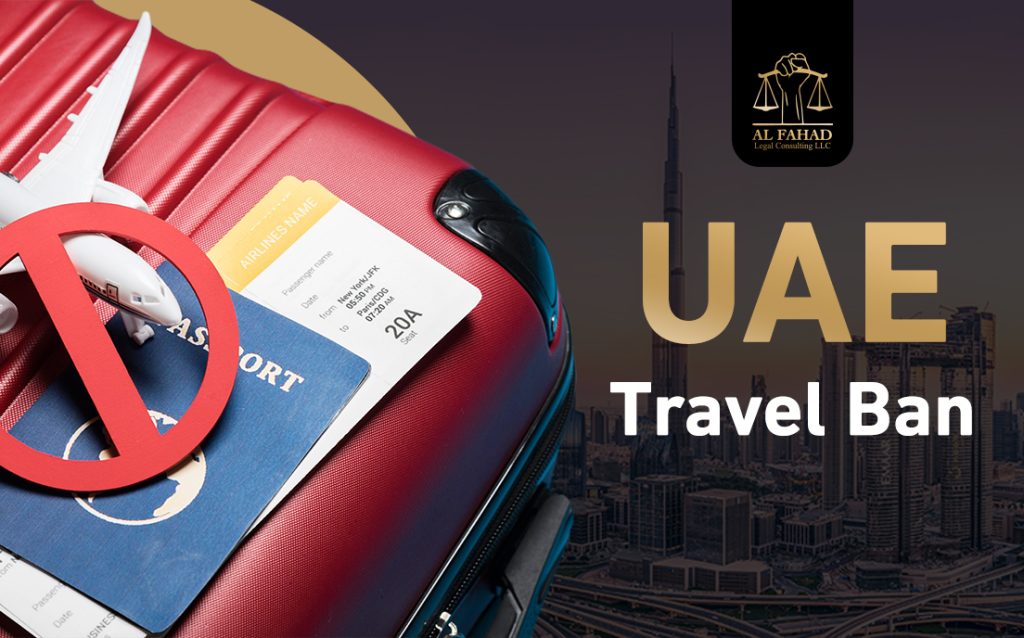
UAE Travel ban
If the debtor is a legal person. An order has been issued to imprison his legal representative or something someone else if refraining from implementation is due to them personally. It is permissible to be prevented from traveling in accordance with the procedures and controls contained in Terms (324) to (326) of this law, and the creditor does not have an executive document against them, after conducting an investigation in both cases.
Article (324) of the Federal Law of Decree No. (42) of 2022 promulgating the Civil Procedure Code stipulates that:
The creditor has the right, even if he accepts filing the substantive lawsuit, if serious reasons arise that fear the debtor’s escape and the debt is not less than (10,000) ten thousand dirhams, unless it is an established alimony, a commitment to work, abstention from work, or work wages may request the competent judge or the head of the department, as the case may be, to issue an order preventing the debtor from traveling in any of the following two cases:
First: If the debt is known and payable and is not restricted by any condition.
Second: If the debt is not of a specific amount, the judge will estimate it temporarily, provided that the following two conditions are met:
A. The right claim is based on a written environment.
B. The creditor must provide a guarantee accepted by the court guaranteeing any loss or damage to the debtor as a result of his travel ban, if it becomes clear that the creditor is not right in his claim to the judge before issuing the order. He may conduct a brief investigation if the documents supporting the request are not sufficient. He may also order the deposit of the debtor’s passport. In the court treasury and circulating the travel ban order to all ports of the country in the event that the travel ban order is issued. The personal status enforcement judge may issue an order preventing the child in custody from traveling in cases that violate the terms and conditions of the provisions stipulated in the Federal Personal Status Law.
Anyone who has been ordered to prevent travel or whose request has been rejected may file a grievance against it according to the procedures prescribed for grievance against orders on petitions, unless the source of the order is the competent enforcement judge, in which case the grievance against his decision shall be in accordance with the procedures stipulated in Clause (1) of Article (209) of this law.
The travel ban order does not prevent the implementation of the final rulings issued for the deportation measure. The travel ban order, in the event of a final ruling or an administrative order for the deportation measure, shall be presented to a judicial committee headed by a judge whose formation shall be issued by a decision of the Council of Ministers to consider the implementation of either. The president of the competent court or his authorized representative may approve the travel of the debtor due to his illness, or one of his first-degree ascendants or descendants, or his spouse. This is a condition for the application to be accompanied by a medical certificate from an official authority stating the need for treatment abroad and the inability of treatment within the country, provided that the order remains. The travel ban is in place.
Article (325) of the Federal Law of Decree No. (42) of 2022 promulgating the Civil Procedure Law stipulates that:
The travel ban order remains in effect until the debtor’s obligation to his creditor who issued the order has expired – for any reason. However, the competent judge orders the lapse of the order. In any of the following cases:
1. If any of the conditions required for a travel ban order are not met.
2. If the creditor agrees in writing to drop the order.
3. If the debtor provides an adequate bank guarantee, or a capable guarantor accepted by the judge, and the guarantee report containing the guarantor’s pledge is accompanied by the ruling or order issued obliging the debtor to issue an executive bond before him according to what this ruling stipulates.
4. If the debtor deposits in the court treasury an amount of money equal to the debt and expenses, and it is allocated to satisfy the right of the creditor upon whose request the order was issued, and this amount is considered to be seized by force of law in favor of the creditor.
5. If the creditor does not provide the judge with evidence that a lawsuit has been filed for the debt within (8) eight days from the issuance of the travel ban order, or does not begin implementing the final ruling issued in his favor within (30) thirty days from the date it becomes final.
6. If three (3) years have passed since the last valid procedure for implementing the final judgment on the debt for which the travel ban was issued without the judgment creditor submitting to the enforcement judge a request to continue the procedures for implementing that judgment.
7. If a request is received from the competent authorities stating that the residence of the person prohibited from traveling in the country has become illegal and he must be deported from it, and it is not proven that he has funds in the country that can be enforced.
As for Article (326) of the Federal Law of Decree No. (42) of 2022 promulgating the Civil Procedure Law, it states:
The provisions of Articles (324) and (325) of this law do not apply to foreigners before whom decisions were issued to extradite them to a foreign country in accordance with the provisions of the federal law. Concerning international judicial cooperation in criminal matters.
In the event that the person executed against him fails to implement the legal texts mentioned above, there are other precautionary measures according to Article (327) of the Federal Law of Decree No. (42) of 2022 issuing the Code of Civil Procedure, which stipulates that:
If the debtor who is prohibited from traveling refuses to hand over his passport If he travels without justification, or it becomes clear to the judge that he has spent his money or smuggled it, or that he is preparing to flee outside the country despite the measures taken to prevent him from travelling, then the judge may decide to bring him in and oblige him to provide a payment bond or an attendance bond, or to deposit the amount he is charged with in the court treasury. If he does not comply For the order, the judge may decide to temporarily seize it until the order is implemented, and this decision is subject to appeal within (7) seven days from the date of its issuance.
Written by:

Mr. Mohammad Salah
CEO / Dubai – UAE



